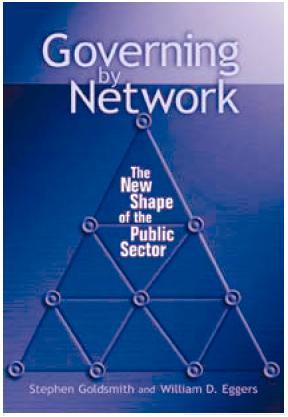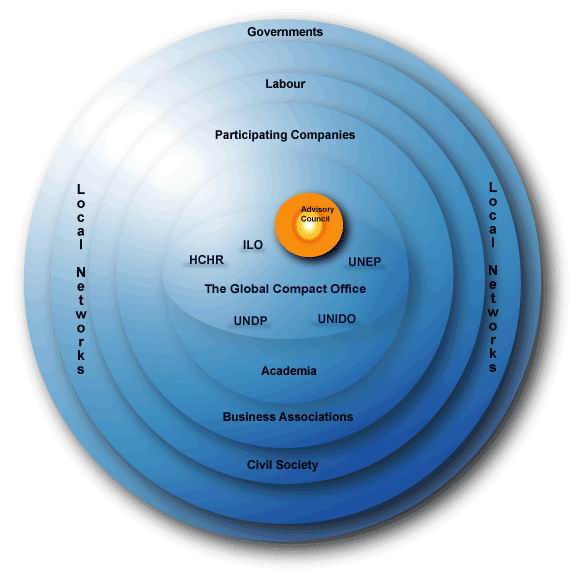|
"In 1993, President
Clinton asked me to
figure out how to
make government work
better and cost
less," the vice
president said. "We
called it
reinventing
government.
The need to reinvent
was clear.
Confidence in
government -- which
is simply confidence
in our own ability
to solve problems by
working together --
had been plummeting
for three decades.
We either had to
rebuild that faith
or abandon the
future to chaos.
“As part of the
initiative to
reinvent government,
the Clinton
administration is
reforming the
federal grant
process into a
system of
"performance
partnerships"
that respond to
these smaller
governmental units
and their local
needs….Such
partnerships signal
a shift away from
traditional federal
grant programs by
moving control and
responsibility back
to the people.”
Jim Fuller, USIA
said "With these
words, President
Bill Clinton, in his
foreword to the
Blair House Papers
proposed a new
public management
model for the
federal government,
one based on forging
new partnerships
with state and local
government:"
Issues of Democracy,
April 1997:
"The era of big
government is over,
but the era of big
challenges is not.
People want smaller
government, but they
also want active and
effective national
leadership. They
want government that
provides them the
means and
opportunities to
meet their
responsibilities and
solve their own
problems."
With these words
President Bill
Clinton, in his
foreword to the
Blair House Papers,
proposed a new
public management
model for the
federal government,
one based on forging
new partnerships
with state and local
governments.
The UN and Civil
Society -
Partnerships
United Nations
Millennium
Development Goals (MDGs)
emphasize ever
increasing
partnerships of the
United Nations with
Civil Society
Organizations, (CSOs),
including with the
private sector and
with other
international
organizations.
Clinton's "new
public management
model" is actually
an old public
management model.
/soviet,
sov-/
• noun 1
(Soviet) a
citizen of the
former Soviet Union.
2
an elected
council in the
former Soviet Union.
3
a revolutionary
council of workers
or peasants in
Russia before 1917.
• adjective
(Soviet) of
or concerning the
former Soviet Union.
— DERIVATIVES Sovietism noun Sovietize (also
Sovietise)
verb
— ORIGIN Russian sovet ‘council’.
Unelected boards,
councils and
commissions are
"soviets". The
soviets are given
regional
jurisdictions -
overriding elected,
representative
government to
implement the
communist agenda for
the Union of
Soviet Socialist
American States -
aka North American
Union.
| Under socialism
all will govern in turn
and will soon become
accustomed
to no one governing
~ Vladimir Lenin ~ |

Article Amazon
|
UNESCO - Medium Term
Strategy
"Cooperation through
partnerships,
alliances
and other
linkages and
mechanisms are
powerful instruments
for addressing
global issues,
supported by a
growing
internationalization
of civil society and
the private sector,
largely due to
electronic
networks.....It is
therefore of crucial
importance to plan
all action, right
from the start,
within the framework
of a partnership
system
allowing for
the most effective
distribution of of labour while
ensuring effective
monitoring of action
and
results.....UNESCO
will also build on
its
long-established
and fruitful
relationships with
numerous NGO's and
representatives of
civil society and
their umbrella
organizations
including Associated
Schools....
National
Commissions, as
constituent elements
of UNESCO under
Article VII of the
UNESCO Constitution
will continue to act
as the central
liaison bodies
between Member
States and the
Secretariat....New
impetus
will be
given to
UNESCO
Clubs, Centres, and
Associations.
Gore Speech at the
International REGO
Conference, January
14, 1999
The Global Compact
Policy Paper on the
Global Compact
"In an address to the
World Economic Forum
on 31 January 1999,
United Nation
Secretary-General
Kofi Annan
challenged business
leaders to join an
international
initiative -- the
Global Compact that
would bring
companies together
with UN agencies,
labour, and civil
society to support
universal
environmental and
social
principles....Through
the power of
collective action,
the Global Compact
seeks to promote
responsible
corporate
citizenship so that
business can be a
part of the solution
to the challenges of globalisation.
In this way,
private sector -- in
partnership with
other social actors
-- can help realize
the
Secretary-General's
vision: a more
sustainable and
inclusive global
economy. "
Look carefully at
the chart below.
'Government' is on
the outer ring.
The reason for that
is because the outer
ring is being pushed
out by socialist network of
'partners' in the UN
system.
The Global Compact
Network
"The
Global
Compact is
a
network-based
initiative.
At its
core are
the Global
Compact
Office,
the
Advisory
Council
and six UN
agencies.
The Global
Compact
involves
all
relevant
social
actors:
governments
who define
the
principles
on which
the
iniative
is based,
companies,
whose
actions it
seeks to
influence,
labour, in
whose
hands the
concrete
process of
global
production
takes
place,
civil
society
organizations,
representing
the wider
community
of
stakeholders,
and the
United
Nations,
the
world's
only truly
global
political
forum, as
an
authoritative
convener
and
facilitator."

(Note: They've
changed the website,
so I had to change
the link... but the
paragraph from the
original link, I
left in).
Global Compact Local
Networks
(They used to be
called cells when we
had honest public
discourse)
"Local networks are
cluster participants
who come together to
advance the Global
Compact and its
principles within a
particular
geographic context.
They perform
increasingly
important roles in
rooting the Global
Compact within
different national,
cultural and
language contexts,
and also in helping
to manage the
organizational
consequences of
rapid expansion.
Their role is to
facilitate the
progress of
companies (both
local firms and
subsidiaries of
foreign
corporations)
engaged in the
compact with respect
to implementation of
the ten principles,
while also creating
opportunities for
multi-stakeholder
engagement."
|

